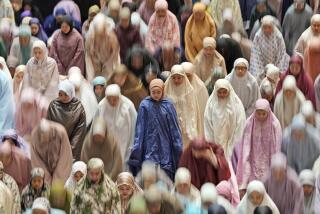‘Everyday Muslims’ Grateful for Protrayal
- Share via
I commend you for the in-depth writing of the five-part series (“Muslims in Las Vegas,” Aug. 1 to 5). Your articles are balanced and have an educational value for the American public at large. You have portrayed Islam and the experiences of everyday American Muslims. Just wearing a scarf (hijab) or sporting a beard does not make a person a lesser citizen of America. Islam, like Christianity and Judaism, has commonality of beliefs and value systems. Bigotry, hatred and discrimination can only be addressed through knowledge, education and fair reporting.
I thank reporter Peter H. King and photographer Genaro Molina for emphasizing that an American Muslim is, like any other good citizen, out there to make America a better place in every possible way. The American dream of a good life with opportunities for every succeeding generation is one and the same for Muslims, Christians, Jews and people of all faiths.
Reshma Farukhi
Orange
*
I suppose The Times expects its readers to find it amusing that Muslim men in Las Vegas are encouraged to “lower (their) gaze” rather than look at women dressed immodestly or not at all (“A Straight Path Through Sin City,” Aug. 1). We Roman Catholics call it “guarding your eyes.” Whatever the expression, it is a discipline common to all religions, indeed common among all men, religious or not, who respect women. After all, what wife wants her husband or what daughter wants her father drooling over some half-naked woman?
No, “lowering your gaze” is something men of honor are called to do, whether working in Las Vegas, walking the streets of Los Angeles or even reading the pages of The Times.
Kevin Aldrich
Pasadena
*
I am a convert to Islam. I wear a headscarf. I have never thought that having two women as a witness or praying behind or next to men disqualified my intelligence. The first is derived from what I believe to be God’s word. I, as a capable, intelligent woman, have chosen to believe that there is a wisdom in having two women as a witness that I may not grasp. And if I really desired an explanation, I’m sure I could find a myriad of them, one of which might even tell me this law is no longer applicable. The sacred law in Islam is a wide road.
Second, where I pray in a mosque as a Muslim woman seems to have become a hot topic for the media. If I pray next to, behind or in front of a man is of absolutely no importance to me. As my feminist aunt has always taught me, I do not define myself by a man. And I don’t think the media do Muslim women any favors when they continually define us by our location relative to a man. It would be refreshing for once to see a story on Muslim women that did not moan of our oppression or celebrate our deviance from the religion, but rather embraced us as equals.
Shannon Staloch
San Jose
More to Read
Sign up for The Wild
We’ll help you find the best places to hike, bike and run, as well as the perfect silent spots for meditation and yoga.
You may occasionally receive promotional content from the Los Angeles Times.






